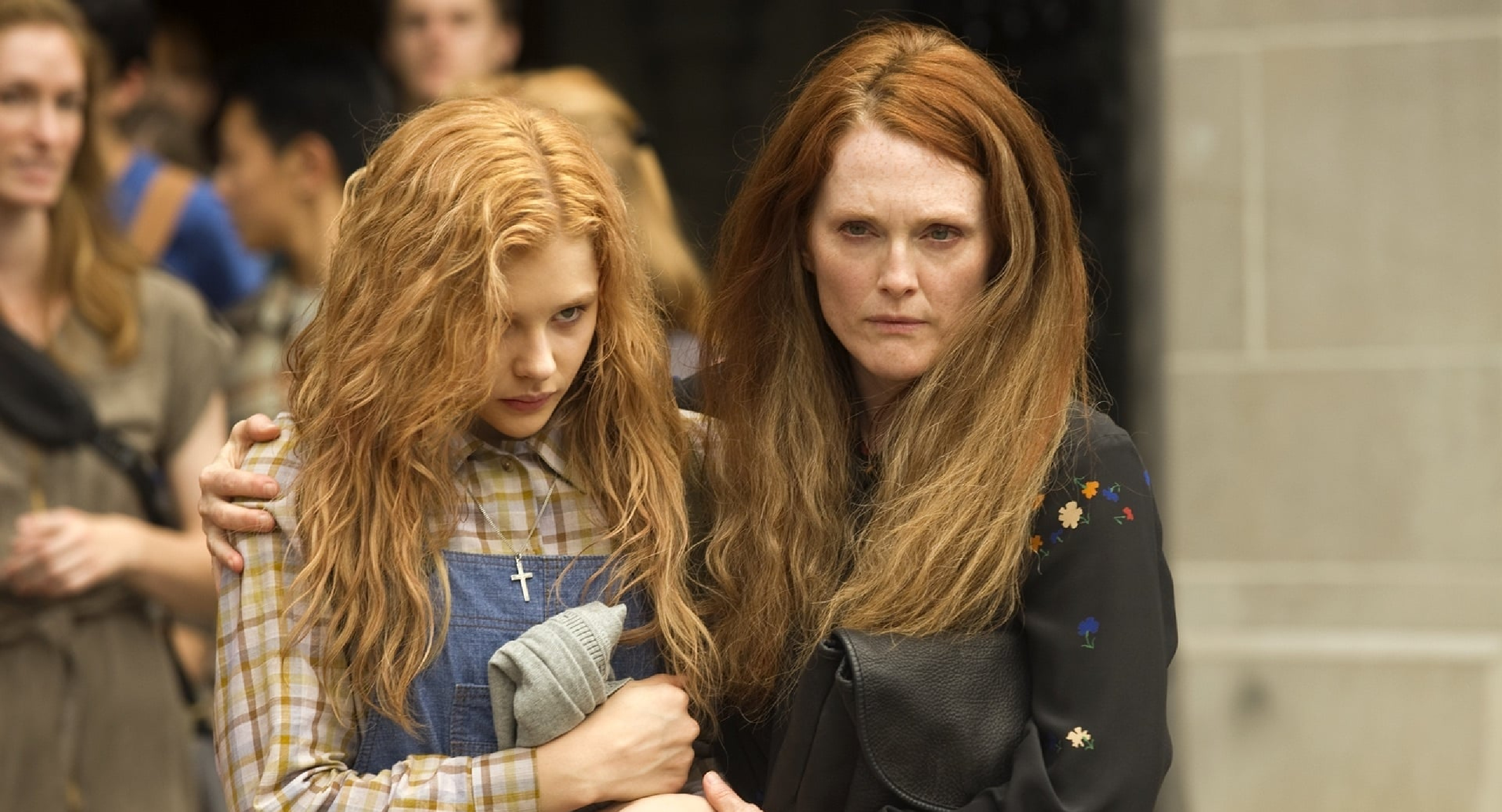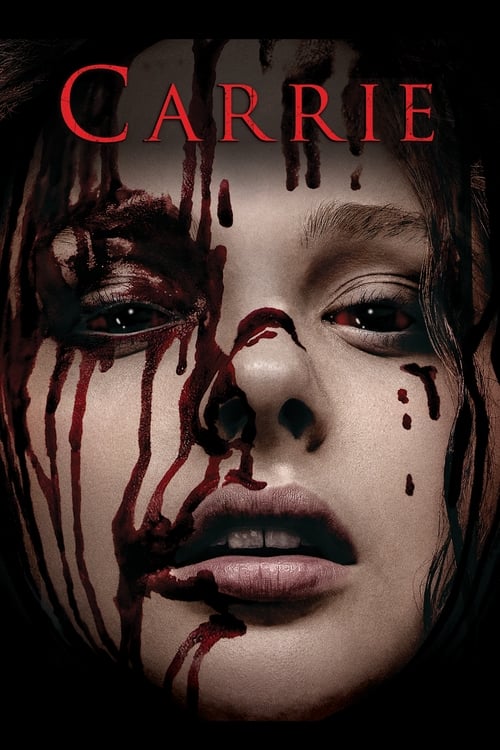Carrie (2013) – Film Review
Published May 30, 2023

High school can be tough for many teenagers, but for Carrie White, it’s especially hellish. A shy and awkward teen being raised by a religious zealot, Carrie is frequently the target of bullies. But Carrie has a secret talent: She can make things move with her mind. One fateful night, an especially cruel prank at her senior prom pushes her over the edge, and Carrie unleashes her telekinetic powers on all who get in her way.
There are few films in the horror genre that have left as indelible a mark on pop culture as Carrie, the 2013 adaptation of Stephen King‘s novel, directed by Kimberly Peirce. This haunting and emotionally charged film delves deep into the themes of bullying, isolation, and the destructive power of repressed emotions. With its stellar performances, expert direction, and visually stunning sequences, Carrie manages to breathe new life into a well-known story while still paying homage to its source material.
The film opens with an unsettling scene of childbirth, immediately setting a tone of discomfort and unease. We are introduced to Carrie White, portrayed brilliantly by Chloë Grace Moretz, a shy and introverted high school student who is relentlessly bullied by her classmates. Moretz’s portrayal of Carrie is nothing short of remarkable; she embodies the character’s vulnerability and fear with an intensity that is both captivating and heartbreaking.
Throughout the film, Peirce explores the devastating consequences of bullying with unflinching honesty. The scenes of cruelty and humiliation inflicted upon Carrie are difficult to watch, but they serve a purpose in conveying the raw emotions and psychological torment experienced by the protagonist. These moments of intense bullying are juxtaposed with tender and poignant scenes of Carrie’s interactions with her mother, played by Julianne Moore. Moore delivers a powerhouse performance as Margaret White, a deeply religious and mentally unstable woman whose strict beliefs exacerbate her daughter’s isolation and inner turmoil. The strained relationship between mother and daughter is at the heart of the film, and Moore’s portrayal of a woman torn between her love for her child and her distorted worldview is both chilling and heartbreaking.
Peirce’s direction is quite strong throughout the film. She creates a sense of claustrophobia and unease, using tight framing and oppressive lighting to heighten the tension. The use of slow-motion and dreamlike sequences adds an ethereal quality to the film, enhancing its overall sense of dread. One standout sequence is the prom scene, which serves as the film’s climax. Peirce builds anticipation meticulously, ratcheting up the suspense as Carrie’s world begins to unravel. The prom itself is beautifully shot, with vibrant colors and elegant cinematography contrasting with the impending chaos that is about to unfold. The use of split-screen during the climactic moments adds a sense of chaos and urgency, immersing the audience in the heart-pounding experience.
What sets Carrie apart from other horror films is its emotional depth and the exploration of Carrie’s supernatural abilities as a metaphor for her burgeoning womanhood and the power of feminine rage. Peirce skillfully weaves in themes of sexuality and empowerment, drawing parallels between Carrie’s telekinetic powers and her growing confidence in herself. This subtext adds layers to the story, elevating it beyond a simple tale of revenge. The film forces us to confront the consequences of society’s mistreatment of those who are different, and the toll it takes on their mental and emotional well-being.
The supporting cast also deserves praise for their performances. Ansel Elgort brings depth to the character of Tommy Ross, the kind-hearted classmate who takes an interest in Carrie. Portia Doubleday shines as Chris Hargensen, the film’s primary antagonist, delivering a chilling portrayal of a popular girl driven by jealousy and cruelty. The ensemble cast as a whole contributes to the film’s authenticity, effectively capturing the complex dynamics of high school life and the various roles people play within it.
It’s worth noting that Carrie does have its flaws. At times, the pacing feels slightly uneven, with certain scenes dragging on while others could have been explored further. Additionally, some of the CGI effects used to portray Carrie’s telekinetic abilities may feel slightly dated, but they do not detract significantly from the overall impact of the film.
The production design and visual aesthetics of Carrie deserve special mention. The use of color and lighting effectively conveys the mood and tone of each scene. The contrast between the stark, sterile interiors of Carrie’s home and the vibrant, warm colors of the prom create a stark juxtaposition that mirrors the stark contrast between Carrie’s isolated existence and the fleeting moments of joy and acceptance she experiences. The attention to detail in the set design, costumes, and makeup further immerses the audience in the world of the film.
Another aspect that adds depth to Carrie is its exploration of religious fanaticism and its impact on individuals and communities. The film raises questions about the destructive power of blind faith and the ways in which it can be used to control and manipulate vulnerable individuals. Peirce handles this sensitive subject matter with nuance, neither vilifying nor trivializing religious beliefs. Instead, she delves into the psychological implications of extreme religious ideologies, showing how they can lead to isolation, fear, and ultimately, tragedy.
The film’s score, composed by Marco Beltrami, effectively enhances the tension and emotional impact of the story. It seamlessly transitions between haunting melodies and intense, pulse-pounding tracks, underscoring the emotional journey of the characters. The use of silence in certain scenes is equally powerful, creating a sense of anticipation and unease.
Carrie, directed by Kimberly Peirce, is a remarkable adaptation that successfully captures the essence of Stephen King’s novel while adding its own unique visual and emotional flair. Peirce’s expert direction, coupled with the outstanding performances of the cast, especially Chloë Grace Moretz and Julianne Moore, elevate the film beyond its horror trappings. It delves deep into themes of bullying, isolation, and the destructive power of repressed emotions, while also exploring the complexities of mother-daughter relationships, female empowerment, and religious fanaticism.
